February 24, 2017
Share:
The Chocolate Case: Transparency in the Chocolate Industry
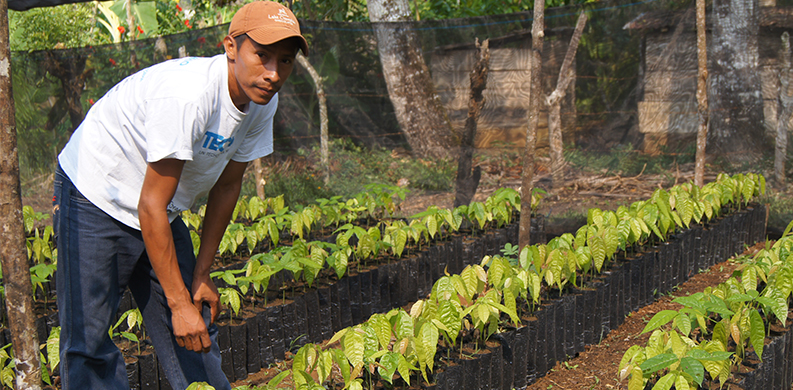
This past weekend, Lake Champlain Chocolates had the honor of sponsoring the Vermont International Film Festival – Global Roots Festival. Originating in 1985, the Vermont International Film Festival (VTIFF) is the world’s oldest environmental and human rights film festival. As a proud member of the community, we love having the ability to give back and sponsor local events.
We were particularly enthusiastic to support the VTIFF, when they announced they would be showing The Chocolate Case, a film about labor practices in the chocolate industry. The documentary follows a journalist, a producer, and a reporter from Dutch TV as they began an investigation into the unethical labor practices within the chocolate industry, namely cacao production and harvest. They are shocked to discover that this issue is being blatantly ignored by many large chocolate manufacturers. In protest, the group searches for slave-free chocolate and end up creating their own chocolate company, Tony’s Chocolonely.
You might be asking yourself, why would we choose to sponsor a film about another chocolate company? The answer is simple. This film addresses issues that are near and dear to our hearts. It speaks to our own journey towards increased transparency and traceability along our supply chain. And it is a topic that we feel everyone needs to understand. Eric Lampman, President of Lake Champlain Chocolates, was on hand at the screening to share a few thoughts about the film and how it relates to what we are doing in Vermont.
I’ve been surrounded by chocolate my entire life. What really struck me, in watching the film, was that I’ve had almost every single one of the reactions that the Tony Chocolonely founders had about questioning where the chocolate comes from…. I believe we've been riding along with them [in the quest for sustainably and ethically produced chocolate] the whole way through.
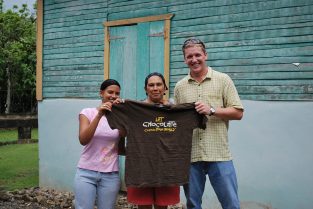
President, Eric Lampman meets with the CONACADO cooperative farmers in the Dominican Republic
Lake Champlain Chocolates has been crafting gourmet chocolate for over 33 years. And since the beginning our mission has been to source only the highest quality ingredients, starting with fresh cream from Monument farms, locally harvested honey, and pure Vermont maple syrup from Allen family farm. Throughout the years, as our company evolved, we have journeyed along a similar path as The Chocolate Case:
In the last 8 or so years, we’ve started really digging into our chocolate supply chain and asking ourselves, how can we do it [sourcing/making chocolate] better? We’ve made a very firm action to transition our chocolate supply to be organic, fair trade certified and fully traceable from farmer cooperatives in South America and the Caribbean.
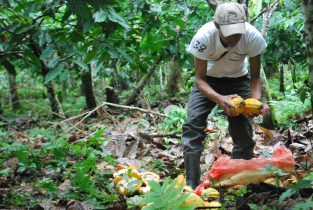
A FUNDALACHUA farmer collects his cacao harvest
In 2009, Eric took a trip to the CONACADO cooperative in the Dominican Republic to see the impact that fair trade premiums have on cocoa farmers and their communities. This trip to origin sparked the idea for a project that would utilize a clean, clear supply chain - the Blue Bandana Chocolate Maker:
For us, the Blue Bandana project was our way to get outside of the supply chain and get curious… to figure out how we can do something here [at Lake Champlain Chocolates] that really does, like what Tony's did, drive a direct line to where the food was coming from. It has also been a huge educational tool. We have been able to talk with our larger suppliers about what we know is available and create something that works for us rather than just ‘ordering off their menu’.
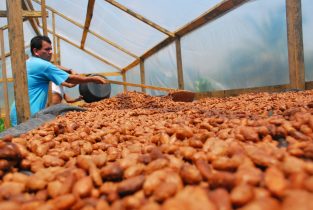
In September 2012, Lake Champlain Chocolates sponsored a Farmer Field Training in the community of Rocja Pomtila where farmers engaged with a cocoa expert and peers to learn best practices for post-harvest handling. Here, Don Carlos spreads beans out in a drying tunnel after a 6 day ferment.
Our Blue Bandana Chocolate has allowed us to develop personal relationships with cocoa farmers. Our biggest success has been our work with the FUNDALACHUA farmers in Guatemala. In 2012 we helped to export their first crop of cacao (6 tonnes). This year, through education and improved post-harvest practices, they have been able to export upwards of 70 tonnes of cocoa across the world.
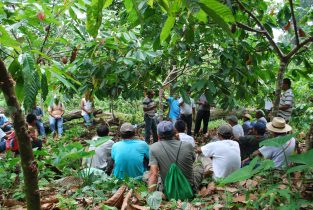
FUNDALACHUA farmers attend a Farmer Field School Training to learn cacao tree grafting techniques.
Throughout the film, the group from Tony’s Chocoloney, strived to create a shift in the way we look at chocolate, not only in terms of consumer education, but across the globe. While this might not have caused a drastic shift in the large conglomerates, Eric definitely recognizes that things have changed in the chocolate industry:
People have really started to question the supply chain. It has created this new sub-category of the industry - the craft industry - the bean to bar chocolate on a very small scale. The goal for these individuals is not to mass produce. They are making a values based decision to be a craft producer of things and chocolate is their medium. The craft chocolate industry is starting to gain momentum and create some really strong supply chains.
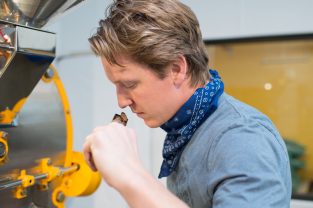
Eric inspects a batch of freshly roasted cacao beans
The story of The Chocolate Case parallels many of the same trials and tribulations we have faced in trying to improve our chocolate supply chain. Using the freshest local ingredients has been our mantra for over 30 years. But, when you are in pursuit of an extraordinary chocolate moment, you must continually strive to do better. Our quest for increased transparency has led to the use of all fair trade chocolate in our confections, while also becoming a 100% fair trade chocolate company. It sparked the innovation of our Blue Bandana Chocolate Maker line of bean to bar chocolates. And it continues to evolve as we create and build upon partnerships with cocoa farmers throughout the world.